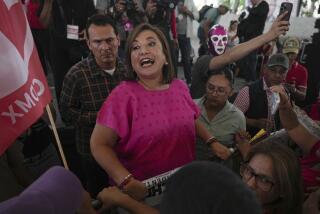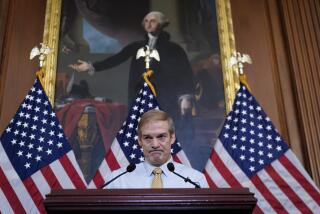Crisis of Confidence Cannot Be Ignored : Clinton must address the alienation over gifts to campaigns
A democracy has no more precious asset than the confidence of its citizens. On paper and in theory many a police state is letter-perfect in its democracy. In practice, if no one believes that the high principles enshrined in a nation’s constitution will be honored, they will not be.
Many Americans have begun to doubt their own democracy. No clearer proof of that doubt exists than the steadily dropping percentage of eligible Americans who vote. A modest uptick occurred in the 1992 presidential election as against the 1988, but even the 55% 1992 turnout is about 20% below what Canada routinely records in its elections, and participation in off-year and local American elections is far lower.
THE PROBLEM: Asked to explain why “it makes no difference” who they vote for, Americans are likely to allude to the special interests and the media. “They” run things, “we” don’t count. Politicians exhort citizens that “every vote counts”; and to be sure, examples come easily to hand of elections settled by a few votes. But at bottom the popular instinct is correct--appallingly correct. Ross Perot may be proof that you can’t win the presidency with paid-for television time alone, but you certainly can’t win that office without it.
As the street-smart saying has it: The Golden Rule is he who has the gold makes the rules. What makes the special interests harmful is not that they have big mouths but that they put big money where their big mouths are. They are buying “access,” as it is called; and though vote buying isn’t legal, access buying is. The American on the street, faintly sick of it all, knows well enough, however, that the one purchase makes the other unnecessary--those with access often have undue influence over government.
Or, put a less ominous way, they control the public agenda so effectively that their contribution becomes nothing more than a smart investment. It is the fact that so many Americans know this in their bones that motivates at least some of them to stay home more than their counterparts do in other Western democracies.
As President, Bill Clinton will be seeking in his first hundred days to build a new kind of confidence between Capitol Hill and the White House. With Democratic majorities in both houses of Congress, he has a better shot at that than any other President since Lyndon B. Johnson. But more important than executive-legislative trust is the deeper trust that must exist between government and the governed. To build this, the new President should lift campaign reform to the very top of his hundred-days agenda.
THE SOLUTION: The details of campaign reform are of mind-numbing complexity. Congress is full of lawyers, and every last one of them is an expert on fund raising, if nothing else. Those details--funding limits, public funding, soft money, bundling, etc.--all need to be addressed. The last reform bill, passed by Congress and vetoed by President Bush, offered a major improvement and could well be revived. It could also be improved, particularly by a closer look at its soft money provisions.
But the time for hand-to-hand combat over the fine print will come when the bill is introduced. For now, our plea is for Bill Clinton to be a man of his word. He said: “There is good reason public confidence in public officials is so low. It ought to be, because of the dominance of special interests over the political process and especially over the campaign finance process. That’s why I strongly support campaign finance reform.” If this reform can be made, Americans will start to recover their belief in the nobility of their own institutions, start to trust that, as Ross Perot liked to put it, “nobody owns me but you.” A candidate shouldn’t have to be a billionaire to make that kind of statement to the people.
More to Read
Get the L.A. Times Politics newsletter
Deeply reported insights into legislation, politics and policy from Sacramento, Washington and beyond. In your inbox three times per week.
You may occasionally receive promotional content from the Los Angeles Times.










